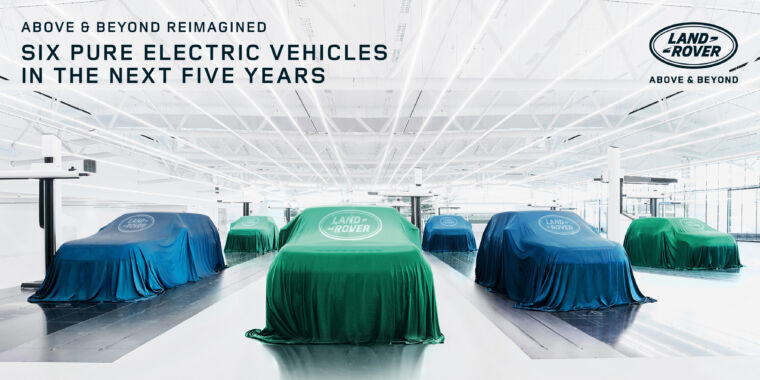
Jaguar Land Rover
Big changes are in store for Jaguar Land Rover. The British automaker has a new global strategy, as revealed on Monday by new CEO Thierry Bolloré. There is a new roadmap for Jaguar, which will lose its internal combustion engines by focusing on purely electric luxury cars. Six new battery-powered EVs are under construction for Land Rover, and the company is also exploring hydrogen fuel cells.
“Jaguar Land Rover is unique in the global automotive industry,” said Bolloré. “Designers of unparalleled models, an unparalleled understanding of their customers’ future luxury needs, emotionally rich brand value, a spirit of Britishness and unparalleled access to the main global players in technology and sustainability within the broader Tata Group. We are leveraging these ingredients today to reimagine the business, the two brands and the customer experience of tomorrow. The Reimagine strategy allows us to enhance and celebrate this uniqueness like never before. Together, we can create an even more sustainable and positive impact on the world around us. “
Under the Reimagine strategy, Bolloré said that JLR will become a “first battery business”. For Land Rover, there are six new BEVs scheduled to arrive by 2026, although the first one is not due until 2024. Future Land Rovers will be built using a pair of new flexible vehicle architectures – Modular Longitudinal Architecture and Electric Modular Architecture – both are agnostics on the power train. And the production of MLA vehicles will take place in Solihull, in the center of Great Britain.
In 2026, the brand will also withdraw its diesel engines, and Bolloré said that by 2036, Land Rover should have zero exhaust emissions, with a goal for the entire company to be carbon neutral by 2039.
No more engines for Jaguars
For Jaguar, Reimagining means canceling the replacement of its XJ sedan; each new Jaguar introduced from now on will be a BEV. In addition, the Jaguar factory in Castle Bromwich in Birmingham, England – which currently manufactures the types XE, XF and F, and which was supposed to build the new XJ – will shut down as a car factory when these three models reach the end of your product life cycles. But instead of closing the site, Bolloré says Jaguar will try to transfer other activities there, including expanding its lucrative Special Vehicle Operations group to the site.
All of these future Jaguars will use a new electric vehicle architecture and the manufacturing of BEV will take place at JLR’s Solihull plant. (Solihull currently builds the Jaguar F-Pace, as well as the Range Rovers.) But designing and building a brand new BEV platform is not a one-minute job, so Jaguar’s all-electric future is scheduled to start only in 2025. What this means that for traditional Jaguar two-seater sports cars remains uncertain, but a replacement for the F-Type is by no means certain, given the low sales volumes.
